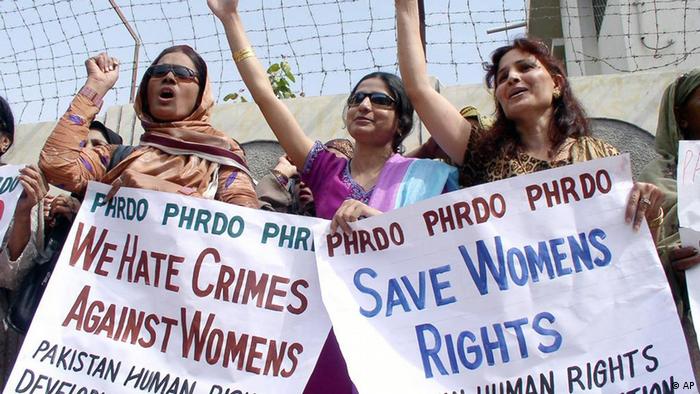Kishwar Mustafa.
The World Economic Forum's Global Gender Gap Report has ranked Pakistan at 143 out of 144 countries surveyed. The disparity represents a systemic and historical disadvantage for women in Pakistani society.
According to the report released last week by the World Economic Forum (WEF), Pakistan is ranked even lower than it was 10 years ago. The reasoning behind this is based on Pakistani women being systematically denied access to important social facilities that determine the gender gap ranking. These include education, health, economic opportunities and political empowerment.
In the past, Pakistan was put under pressure by the international community to address gender inequality. In 1979, Pakistan established the Ministry for Women's Development in response to recommendations from the UN Commission on the Status of Women. This ministry facilitated women's access to education, health, legal services and ensured their placement in provincial and national legislatures. It also set up services like credit facilities for women, study and computer centers, child care and hostels for working women.
Nothing but good intentions
These steps indeed helped women, but because of the patriarchal nature of the society and religious backlash, they never became a normal part of Pakistan's social structure and political system.
Even when Pakistan had a female chief executive, Pakistan's women never felt that they had a representative in the prime minister's house. And after the dissolution of the Ministry for Women's Development in 2010, these initiatives were left at the mercy of provincial governments.
According to former federal secretary Rukhsana Shah, the initiatives were lacking political will. "They did not appear to have the capacity to develop an alternative narrative to the rampant obscurantism proliferating throughout the country," she said.
Taking the gender gap seriously
Shahida Jameel was the first woman to be appointed as the Federal Minister of Law, Justice, and Parliamentary Affairs of Pakistan. She said that nobody in Pakistan has ever taken the issue of gender disparity seriously, including the former prime minister, and first female leader of Pakistan, Benazir Bhutto.
"You will be amazed to know that no women besides the late Nusrat Bhutto and the late Benazir Bhutto were allowed to be mainstream members of their party," said Jameel. "All the other women were limited to the women's wing and were not allowed to occupy mainstream membership," she said.
Jameel added that this was a well kept secret for 30 years and that even when a step was taken to improve integrating women into the system, it was not to elevate the status of women, but rather to appease the international community.
"Since our government was going to attend an international forum, they hastily decided to introduce a women's protection bill just for the sake of international approval," said Jameel. "What they did was nothing new, they did the same in 2010 also when they introduced a bill in which would define honor killings as murder."
Jameel said that the government regularly comes up with dramatic gestures like this to show the world how "democratic and legitimate" they are. "They do nothing for women," she added.

Given the opportunity, the women of Pakistan have done remarkably well in almost every field from the Oscars to the Nobel Prize
Legal restrictions on women
Even women who are elected in Pakistan are hindered by the 18th Amendment, which stipulates that cannot work or vote without the instructions of the party leaders, and if they fail to comply, they shall be expelled from the assemblies.
"Our women are very strong and can do everything, but in order to achieve anything, you have to remove the reins from the hands of their own political parties," said Jameel.
Given the opportunity, the women of Pakistan have done remarkably well in almost every field from the Oscars to the Nobel Prize. These positive examples that come under the limelight can multiply if the state feels a genuine desire to utilize the talents of women.
As stated by former federal secretary Rukhsana Shah, "The state needs to emerge from its stupor to stop this shameful slide of half of its population into the dark ages, considering not only global requirements, but also its own economic imperatives."


No comments:
Post a Comment